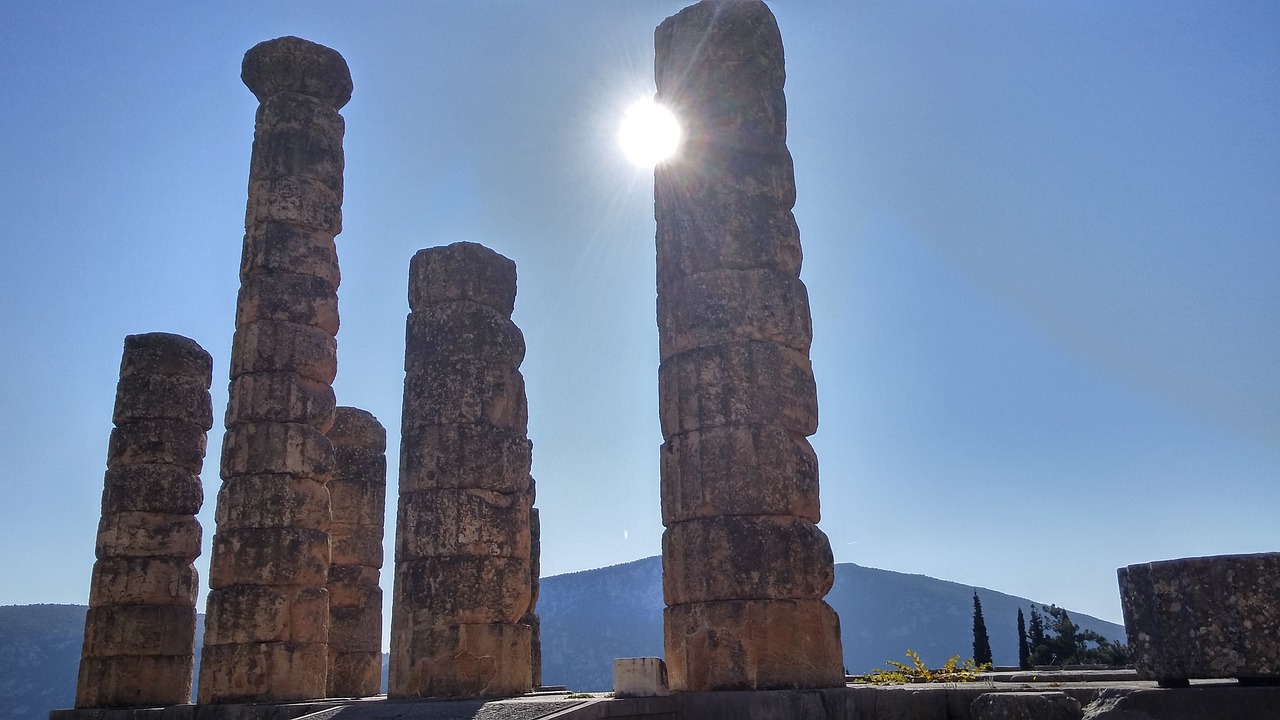The Secrets of the Ancient Greeks' Political Systems
Delving into the enigmatic world of ancient Greek political structures unveils a tapestry of diverse systems that laid the groundwork for modern governance. From the birth of democracy in Athens to the oligarchic rule in Sparta and the tyrannical regimes of Corinth, the ancient Greeks navigated a complex political landscape that continues to fascinate and inspire.
At the heart of ancient Greek political philosophy lies the Athenian democracy, a revolutionary system that empowered citizens to participate in decision-making processes. The Assembly of Athens, a cornerstone of democracy, symbolized the collective voice of the people, shaping policies and laws through open debates and voting.
Contrasting the democratic ideals of Athens, Sparta embraced an oligarchic structure characterized by a council of elders and dual kingship. The rigid social hierarchy in Sparta underscored the importance of military prowess and discipline, shaping the city-state's unique governance model.
Meanwhile, in Corinth, the rise of tyrants challenged traditional power dynamics, ushering in an era of centralized rule. The Delphic Oracle, a revered institution in ancient Greece, wielded significant influence over political decisions, offering prophecies and advice that guided the course of governance.
The role of citizens in ancient Greek political systems was paramount, with individuals actively participating in civic life through various institutions and assemblies. Philosophical giants like Plato and Aristotle contributed to the intellectual discourse on governance, laying the foundation for political theory that transcends time.
The legacy of ancient Greek political systems endures, shaping contemporary ideologies and structures worldwide. By unraveling the secrets of the past, we gain insight into the evolution of governance and the enduring impact of ancient Greek political thought on modern society.
Q: How did Athenian democracy differ from modern democracy?
A: Athenian democracy was direct, with citizens directly participating in decision-making processes through the Assembly. In contrast, modern democracies often operate on a representative system where elected officials make decisions on behalf of the people.
Q: What role did the Delphic Oracle play in ancient Greek politics?
A: The Delphic Oracle was consulted on important political matters and its prophecies were believed to guide rulers in making decisions. The Oracle's influence was significant in shaping the course of governance in ancient Greece.
Q: How did Spartan oligarchy differ from other Greek city-states?
A: Spartan oligarchy was characterized by a dual kingship and a council of elders known as the Gerousia. The emphasis on military prowess and discipline set Sparta apart from other city-states, shaping its unique governance structure.

Athenian Democracy
Athenian Democracy stands as a beacon of political innovation, heralding a system where power resided in the hands of the people rather than a select few. Rooted in the bustling city-state of Athens, this democratic model paved the way for modern governance structures worldwide. Imagine a society where every eligible citizen had a voice, where decisions were made collectively, and where the ideals of equality and justice flourished like never before.
The heart of Athenian Democracy beat within the Assembly, a gathering of citizens who debated, voted on laws, and decided the fate of the state. Picture a bustling agora filled with passionate individuals, each eager to contribute to the greater good. This Assembly was not just a place of discourse but a symbol of empowerment, where even the humblest of citizens could sway the course of history.
Moreover, Athenian Democracy wasn't just about direct participation; it was a system that embraced the concept of citizenry. Every eligible Athenian had the right and duty to engage in politics, to serve on juries, and to partake in the administration of justice. This active involvement of citizens in governance was a revolutionary concept, challenging the traditional notions of rulership and authority.
Delving deeper into the intricacies of Athenian Democracy reveals a complex web of institutions and practices that upheld the principles of equality and freedom. From the Council of 500 to the Courts of Law, every aspect of Athenian political life was designed to ensure fairness and transparency. The idea of a government by the people, for the people, was not just a slogan but a lived reality in ancient Athens.
As we gaze back at the shining example of Athenian Democracy, we can't help but wonder: What lessons can we learn from this ancient system? How can we adapt its principles to address the challenges of our modern world? The legacy of Athenian Democracy is not just a relic of the past but a guiding light for the future, reminding us of the power of collective action and the importance of active citizenship.

Spartan Oligarchy
Delving into the unique political structure of ancient Sparta, the Spartan Oligarchy stands out as a fascinating system characterized by its emphasis on military prowess and strict social hierarchy. In this oligarchic system, power was concentrated in the hands of a select few, notably the council of elders known as the Gerousia. Comprised of 28 elders over the age of 60, the Gerousia played a crucial role in decision-making and governance, offering a conservative and stabilizing influence on Spartan society.
Furthermore, the dual kingship in Sparta added another layer of complexity to the oligarchic system. With two hereditary kings reigning simultaneously, each king shared authority and responsibilities, ensuring a balance of power within the ruling class. This dual kingship arrangement provided a sense of continuity and unity in Spartan leadership, bolstering the stability of the oligarchy.
Central to the Spartan Oligarchy was the strict social hierarchy that defined every aspect of Spartan life. The division of society into distinct classes, with the Spartiates at the top, followed by the Perioikoi and Helots, reinforced the oligarchic structure and maintained order through a system of rigorous discipline and military training.

Corinthian Tyranny
The Corinthian tyranny was a significant aspect of ancient Greek political history, characterized by the rise of tyrants who held absolute power over the city-state of Corinth. These tyrants often seized control through force or manipulation, ruling with unchecked authority and often suppressing dissent through fear and intimidation. The concept of tyranny in Corinth differed from the democratic principles of Athens and the oligarchic structure of Sparta, showcasing the diverse political landscape within ancient Greece.
Under the rule of tyrants, Corinth experienced both stability and upheaval, as these leaders implemented policies and reforms according to their own agendas. The influence of tyrannical regimes in Corinth extended beyond political governance, impacting social dynamics, economic policies, and even cultural practices within the city-state. The rise and fall of tyrants in Corinth reflected the volatile nature of power struggles in ancient Greek society, where individuals could ascend to authority through unconventional means.
One prominent example of Corinthian tyranny was the reign of Cypselus, who established a dynasty that ruled Corinth for several generations. Cypselus and his descendants wielded power with a firm grip, centralizing authority and implementing policies that aimed to consolidate control over the city-state. The legacy of Corinthian tyranny left a lasting impression on the political landscape of ancient Greece, influencing subsequent developments in governance and power dynamics.

Delphic Oracle's Influence
The Delphic Oracle held immense influence in ancient Greece, shaping political decisions and guiding the course of governance through enigmatic prophecies and cryptic advice. Situated in the sanctuary of Apollo at Delphi, the Oracle was revered as the mouthpiece of the gods, consulted by rulers, statesmen, and individuals seeking guidance on matters of statecraft and personal significance. The Oracle's pronouncements were often open to interpretation, requiring skilled interpreters to decipher their meaning and apply them to political contexts.
Political leaders across the Greek city-states regarded the Delphic Oracle's counsel with great reverence, believing that adherence to its directives would ensure success and prosperity. The Oracle's influence extended beyond mere predictions, as its pronouncements were believed to carry divine authority, shaping the decisions of rulers and influencing the course of wars, alliances, and internal governance. The Delphic Oracle's enigmatic utterances were considered pivotal in navigating the complex tapestry of ancient Greek politics.
Moreover, the Delphic Oracle's influence transcended the realm of politics, permeating various aspects of Greek society and culture. Its pronouncements often touched upon ethical, moral, and philosophical matters, guiding individuals and communities in matters of justice, piety, and personal conduct. The Oracle's role as a spiritual and moral compass further solidified its position as a revered institution, wielding significant power in shaping the collective consciousness of the Greek populace.
Through the Delphic Oracle's influence, the intersection of divine guidance and human agency was manifested in the intricate tapestry of ancient Greek political systems. Rulers and citizens alike navigated the complexities of governance with one ear tuned to the enigmatic pronouncements of the Oracle, seeking clarity, direction, and divine sanction in their political endeavors. The Oracle's enduring legacy as a beacon of wisdom and insight continues to captivate scholars and enthusiasts, offering a glimpse into the mystical and profound influence it wielded in the annals of ancient Greek history.

Assembly of Athens
The Assembly of Athens, known as the Ekklesia, stood as a fundamental institution in the democratic system of ancient Greece. Comprised of male citizens over the age of 18, this assembly served as the voice of the people, where decisions on legislation, war, and other crucial matters were made. Imagine a bustling marketplace where citizens gathered to debate, vote, and shape the course of their city-state's destiny. The Assembly of Athens embodied the essence of direct democracy, where every eligible citizen had the opportunity to participate and influence the governance of their polis.

Role of Citizens
In ancient Greek political systems, the role of citizens was paramount, serving as the foundation of governance and decision-making. Citizens were actively involved in various aspects of political life, from participating in assemblies to serving on juries and holding public office. They had the responsibility to contribute to the well-being of the city-state and uphold its laws and values.
Citizenship in ancient Greece was not universal, as it excluded women, slaves, and foreigners. Only free adult males who completed military training were considered full citizens with political rights. These citizens had the privilege of voting on important issues, proposing laws, and debating policies in the assembly.
The citizen body played a crucial role in upholding the principles of democracy, ensuring that decisions were made collectively and in the best interest of the community. Through direct participation in government institutions such as the Assembly of Athens, citizens had a voice in shaping the policies that governed their city-state.
Moreover, citizens were expected to serve on juries, where they would deliberate and pass judgments on legal cases. This duty not only ensured the fair administration of justice but also reinforced the idea of civic duty and responsibility among the citizenry.
While citizens enjoyed certain rights and privileges, they also bore the burden of obligations to the state. Military service, payment of taxes, and adherence to laws were essential duties expected of citizens to maintain the stability and prosperity of the city-state.
Overall, the role of citizens in ancient Greek political systems was pivotal, embodying the ideals of civic engagement, collective decision-making, and civic responsibility. Their active participation in governance laid the groundwork for democratic principles that continue to influence modern political systems.

Political Philosophy
Political philosophy in ancient Greece was a vibrant field of intellectual inquiry that sought to understand the nature of governance, justice, and the ideal state. Influential thinkers such as Plato and Aristotle delved deep into questions of power, ethics, and the role of the citizen in shaping political structures. Plato's "Republic" envisioned a utopian society governed by philosopher-kings, emphasizing the importance of wisdom and virtue in leadership. Aristotle, on the other hand, analyzed different forms of government in his work "Politics," advocating for a balanced constitution that blends elements of democracy, aristocracy, and monarchy.
These philosophical musings not only shaped the political landscape of ancient Greece but also laid the groundwork for Western political thought. The concept of the rule of law, the separation of powers, and the idea of civic duty all find their roots in the writings of these ancient philosophers. Their ideas continue to resonate in contemporary debates on democracy, justice, and the nature of good governance.
Moreover, the exploration of political philosophy in ancient Greece was not limited to theoretical discussions but also had practical implications. Philosophers like Socrates engaged in critical dialogue with citizens, challenging conventional wisdom and prompting reflection on the nature of political authority. This intellectual ferment contributed to a culture of debate and inquiry that was essential for the flourishing of democracy and civic engagement.
Overall, the political philosophy of ancient Greece serves as a rich tapestry of ideas and insights that continue to inspire scholars and policymakers to this day. By examining the enduring legacy of these philosophical traditions, we gain a deeper understanding of the complexities of governance and the perennial quest for justice and the common good.

Legacy and Influence
The legacy of ancient Greek political systems reverberates through the corridors of history, leaving an indelible mark on the evolution of governance and societal structures. The democratic ideals birthed in Athens continue to inspire nations worldwide, serving as a beacon of participatory governance and civic engagement.
Furthermore, the oligarchic model embodied by Sparta offers insights into the dynamics of power distribution and the delicate balance between authority and accountability. The rigid social hierarchy and emphasis on military prowess in Spartan governance have influenced military strategies and leadership principles for centuries.
Ancient Corinth's experience with tyranny sheds light on the dangers of unchecked power and the consequences of authoritarian rule. The rise and fall of tyrants in Corinth serve as cautionary tales, prompting reflection on the fragility of political systems and the importance of institutional checks and balances.
The Delphic Oracle's influence on political decision-making underscores the intersection of religion and governance in ancient Greece. The mystical pronouncements of the Oracle shaped policies and strategies, highlighting the interconnectedness of spiritual beliefs and political realities.
Moreover, the Assembly of Athens stands as a testament to the power of collective decision-making and the voice of the citizenry in shaping public policy. The participatory nature of Athenian democracy set a precedent for inclusive governance, emphasizing the importance of civic engagement and political discourse.
Ancient Greek political philosophy, as expounded by luminaries like Plato and Aristotle, continues to inform contemporary debates on justice, ethics, and the nature of good governance. Their enduring insights into the complexities of human nature and the ideal state provide a philosophical foundation for modern political theory.
In conclusion, the legacy of ancient Greek political systems endures as a source of inspiration and contemplation for scholars, policymakers, and citizens alike. By delving into the rich tapestry of democratic ideals, oligarchic structures, tyrannical pitfalls, and philosophical musings, we unravel the intricate web of influences that shape our present-day political landscape.
Frequently Asked Questions
- What were the key characteristics of Athenian democracy?
Athenian democracy was characterized by direct citizen participation in decision-making, the use of ostracism to remove unpopular leaders, and the implementation of a lottery system to select officials.
- How did Spartan oligarchy differ from other political systems?
Spartan oligarchy was unique due to its emphasis on military prowess, the strict division of society into social classes, and the presence of dual kings who shared power with the council of elders.
- What role did the Delphic Oracle play in ancient Greek politics?
The Delphic Oracle was consulted for important decisions, providing prophecies and advice that influenced political strategies, military campaigns, and the governance of city-states.
- How did ancient Greek citizens participate in political life?
Citizens engaged in political affairs through assemblies, such as the Assembly of Athens, where they debated and voted on laws and policies, ensuring their direct involvement in governance.
- What was the significance of political philosophy in ancient Greece?
Political philosophy in ancient Greece, as expounded by thinkers like Plato and Aristotle, laid the groundwork for ethical governance, the ideal state, and the balance of power in political structures.



















